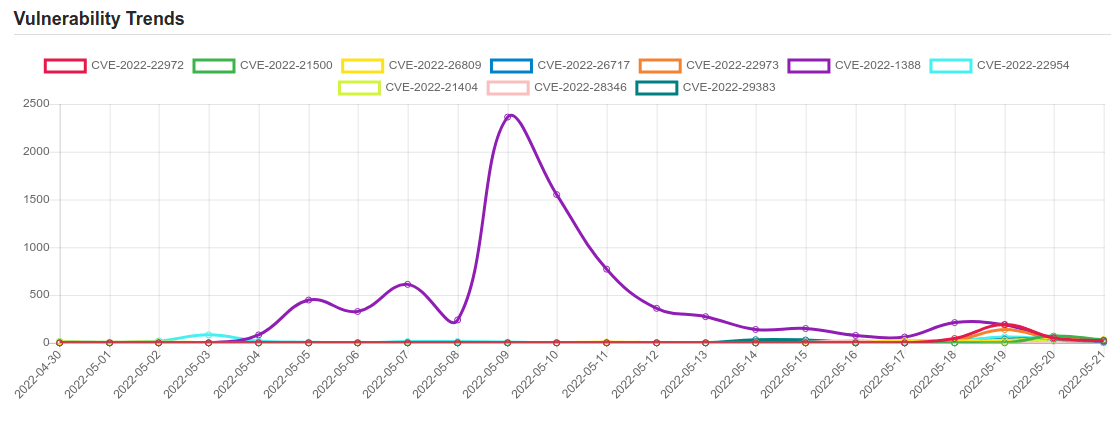Daily Vulnerability Trends: Mon May 23 2022

| CVE NAME | CVE Description |
| CVE-2022-22960 | VMware Workspace ONE Access, Identity Manager and vRealize Automation contain a privilege escalation vulnerability due to improper permissions in support scripts. A malicious actor with local access can escalate privileges to ‘root’. |
| CVE-2022-24706 | In Apache CouchDB prior to 3.2.2, an attacker can access an improperly secured default installation without authenticating and gain admin privileges. The CouchDB documentation has always made recommendations for properly securing an installation, including recommending using a firewall in front of all CouchDB installations. |
| CVE-2022-26763 | No description provided |
| CVE-2022-30525 | A OS command injection vulnerability in the CGI program of Zyxel USG FLEX 100(W) firmware versions 5.00 through 5.21 Patch 1, USG FLEX 200 firmware versions 5.00 through 5.21 Patch 1, USG FLEX 500 firmware versions 5.00 through 5.21 Patch 1, USG FLEX 700 firmware versions 5.00 through 5.21 Patch 1, USG FLEX 50(W) firmware versions 5.10 through 5.21 Patch 1, USG20(W)-VPN firmware versions 5.10 through 5.21 Patch 1, ATP series firmware versions 5.10 through 5.21 Patch 1, VPN series firmware versions 4.60 through 5.21 Patch 1, which could allow an attacker to modify specific files and then execute some OS commands on a vulnerable device. |
| CVE-2022-26889 | The lack of sanitization in a relative url path in a search parameter allows for arbitrary injection of external content in Splunk Enterprise versions before 8.1.2. |
| CVE-2022-26923 | Active Directory Domain Services Elevation of Privilege Vulnerability. |
| CVE-2022-1183 | On vulnerable configurations, the named daemon may, in some circumstances, terminate with an assertion failure. Vulnerable configurations are those that include a reference to http within the listen-on statements in their named.conf. TLS is used by both DNS over TLS (DoT) and DNS over HTTPS (DoH), but configurations using DoT alone are unaffected. Affects BIND 9.18.0 -> 9.18.2 and version 9.19.0 of the BIND 9.19 development branch. |
| CVE-2021-27905 | The ReplicationHandler (normally registered at “/replication” under a Solr core) in Apache Solr has a “masterUrl” (also “leaderUrl” alias) parameter that is used to designate another ReplicationHandler on another Solr core to replicate index data into the local core. To prevent a SSRF vulnerability, Solr ought to check these parameters against a similar configuration it uses for the “shards” parameter. Prior to this bug getting fixed, it did not. This problem affects essentially all Solr versions prior to it getting fixed in 8.8.2. |
| CVE-2022-21500 | Vulnerability in Oracle E-Business Suite (component: Manage Proxies). Supported versions that are affected are 12.1 and 12.2. Easily exploitable vulnerability allows unauthenticated attacker with network access via HTTP to compromise Oracle E-Business Suite. Successful attacks of this vulnerability can result in unauthorized access to critical data or complete access to all Oracle E-Business Suite accessible data. Note: Authentication is required for successful attack, however the user may be self-registered. CVSS 3.1 Base Score 7.5 (Confidentiality impacts). CVSS Vector: (CVSS:3.1/AV:N/AC:L/PR:N/UI:N/S:U/C:H/I:N/A:N). |
| CVE-2022-26809 | Remote Procedure Call Runtime Remote Code Execution Vulnerability. This CVE ID is unique from CVE-2022-24492, CVE-2022-24528. |
| CVE-2022-26717 | No description provided |
| CVE-2022-22973 | VMware Workspace ONE Access and Identity Manager contain a privilege escalation vulnerability. A malicious actor with local access can escalate privileges to ‘root’. |
| CVE-2022-1388 | On F5 BIG-IP 16.1.x versions prior to 16.1.2.2, 15.1.x versions prior to 15.1.5.1, 14.1.x versions prior to 14.1.4.6, 13.1.x versions prior to 13.1.5, and all 12.1.x and 11.6.x versions, undisclosed requests may bypass iControl REST authentication. Note: Software versions which have reached End of Technical Support (EoTS) are not evaluated |
| CVE-2022-22954 | VMware Workspace ONE Access and Identity Manager contain a remote code execution vulnerability due to server-side template injection. A malicious actor with network access can trigger a server-side template injection that may result in remote code execution. |
| CVE-2022-21404 | Vulnerability in the Helidon product of Oracle Fusion Middleware (component: Reactive WebServer). Supported versions that are affected are 1.4.10 and 2.0.0-RC1. Difficult to exploit vulnerability allows unauthenticated attacker with network access via HTTP to compromise Helidon. Successful attacks of this vulnerability can result in takeover of Helidon. CVSS 3.1 Base Score 8.1 (Confidentiality, Integrity and Availability impacts). CVSS Vector: (CVSS:3.1/AV:N/AC:H/PR:N/UI:N/S:U/C:H/I:H/A:H). |
| CVE-2022-28346 | An issue was discovered in Django 2.2 before 2.2.28, 3.2 before 3.2.13, and 4.0 before 4.0.4. QuerySet.annotate(), aggregate(), and extra() methods are subject to SQL injection in column aliases via a crafted dictionary (with dictionary expansion) as the passed **kwargs. |
| CVE-2022-29383 | NETGEAR ProSafe SSL VPN firmware FVS336Gv2 and FVS336Gv3 was discovered to contain a SQL injection vulnerability via USERDBDomains.Domainname at cgi-bin/platform.cgi. |
| CVE-2022-31245 | mailcow before 2022-05d allows a remote authenticated user to inject OS commands and escalate privileges to domain admin via the –debug option in conjunction with the —PIPEMESS option in Sync Jobs. |
| CVE-2022-1806 | Cross-site Scripting (XSS) – Reflected in GitHub repository rtxteam/rtx prior to checkpoint_2022-05-18. |
| CVE-2022-22972 | VMware Workspace ONE Access, VMware Identity Manager, and VMware vRealize Automation security bypass | CVE-2022-22972 |
If you like the site, please consider joining the telegram channel and supporting us on Patreon using the button below.


